Some Thoughts on the Publishing Crisis, Part III: Speaking Out
My last post, discussing causes of the decline in book sales and contraction in the industry, elicited some concerns among readers about its pessimism, even though I promised future posts on ways writers and artists can respond. (And if you missed it, my first installment of the series is here.) I would like to begin by pointing out two things: these problems are cyclical and books are still one of the cheapest forms of entertainment. They’re even cheaper if one gets their books from the library.
This brings me to the next topic — how we can respond to two recent threats that have affected book sales for the children’s and young adult market. There’s little we can do to address demographic changes and inflation, but we can push back against both book censorship and algorithms, in the process creating more opportunities for debut and marginalized book creators.
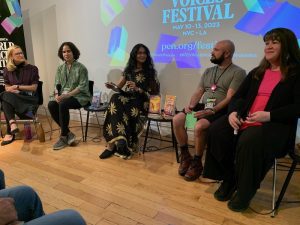
PEN World Voices panelists speaking out about book bans, from left, Ruta Sepetys, Zetta Elliott, Padma Venkatraman, Kyle Lukoff, Traci Sorell.
In my last post, I discussed why censorship has impacted book sales, especially sales of books for young readers. I want to begin here by saying censorship is everyone’s problem. You may think that you’re not affected if you are white, upper middle class, cisgender and heterosexual, abled, and not a religious minority, and if your books have zero sex, LGBTQ+ content, or controversial politics. Wrong. Ruta Sepetys’s acclaimed YA novel Between Shades of Gray has been challenged despite having no sexual content and exposing the brutality of the communist regime in the USSR. Apparently, the censors confused this titles with the erotic Twilight series knockoff 50 Shades of Gray. That didn’t stop censors from setting their sights on her future books, as Out of the Easy and Salt to the Sea have also turned up on banned books lists. Now this award-winning, bestselling author (and onetime country music publicist) is traveling the country speaking out against book bans.
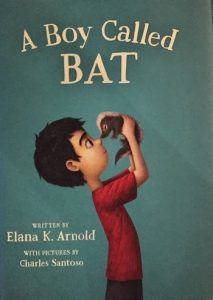 Even if your non-controversial book escapes a challenge for strange or inexplicable reasons (and you’d be surprised at some of the books that end up on lists — for instance, Elana K. Arnold’s early middle grade BAT series), book bans have led to the closing of school and public libraries and freezes on the acquisitions of ALL books. So if you think book bans are someone else’s problem, or they maybe brought it on themselves by writing about controversial or taboo topics, that is not correct. You too need to show up at school board meetings to speak out in favor of books in classrooms and libraries in general. You need to contact your elected officials to overturn or prevent the passage of laws restricting freedom of expression. Maybe your elected will be more likely to listen to you if you share their party affiliation, and in any case, ending censorship and deescalating battles over books will help everyone’s career — including yours.
Even if your non-controversial book escapes a challenge for strange or inexplicable reasons (and you’d be surprised at some of the books that end up on lists — for instance, Elana K. Arnold’s early middle grade BAT series), book bans have led to the closing of school and public libraries and freezes on the acquisitions of ALL books. So if you think book bans are someone else’s problem, or they maybe brought it on themselves by writing about controversial or taboo topics, that is not correct. You too need to show up at school board meetings to speak out in favor of books in classrooms and libraries in general. You need to contact your elected officials to overturn or prevent the passage of laws restricting freedom of expression. Maybe your elected will be more likely to listen to you if you share their party affiliation, and in any case, ending censorship and deescalating battles over books will help everyone’s career — including yours.
So now that I’ve argued that all creators of books for young people need to stand together regardless of background, political affiliation, and nature of their work, I’ll turn to the second area of resistance — the algorithm. A certain online retailer has become very successful by selling an unlimited range of books at low prices, with quick shipping, but this convenience comes at a price. Last week I discussed how the way they recommend books disadvantages new titles and debut authors. Again, there’s a win-win solution that may require sacrifices of price and/or convenience — but not necessarily both! And that solution strengthens and enriches the communities where we all live.
I’m talking about the independent bookstore and the library. The artificial intelligence that recommends books to you only pretends to know you. Not only is it not a human but it also threatens to make us humans superfluous. That’s one reason screenwriters and actors are on strike now. Studios want to use their current work as training for AI to generate formulaic scripts and images of background actors. By “adopting” an independent bookstore in your neighborhood, buying its wares, and using the dedicated staff with local, up-to-date knowledge to recommend the best books for you, you’re striking a blow against artificial intelligence and big tech in general. Don’t have an independent bookstore in your area? Any brick-and-mortar bookstore (not only B & N but also Target, Walmart, etc.) is one more occupied storefront. Plus, there’s Bookshop.org, which uses a small percentage of sales to support independent bookstores in general, and with that support, an entrepreneur in your town may be encouraged to open up one of these important community spaces. Whatever you do, please don’t photograph the book at your local independent bookstore and then order it from an online retailer. If you don’t support your local resources, you won’t have them when you need them. You’ll become prey for those predatory algorithms instead.
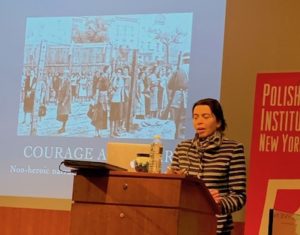
The library as community resource. Before the pandemic, I attended a presentation at the Brooklyn Public Library about the WWII history of L’viv, Ukraine. Historian Ola Hnatiuk’s insights have additional relevance today.
Another place to go for personalized, up-to-date book recommendations is your local library. The librarian can recommend books for you to check out or buy. You can also request books, which also helps out book creators. A library sale is a sale — and better yet, a sale that can’t be returned the way bookstores can return unsold books. In fact, many publishers, including the publishers of my recent books Film Makers and Torch, sell the majority of their books to schools and libraries. Checking books out from libraries helps those libraries gain support from the community, since circulation statistics are often used when approaching local governments and taxpayers for funding. With the increase in e-books and online reference resources in the past few decades, many people predicted the death of public libraries. That has not happened, because libraries now provide those electronic resources for the entire community — including those who cannot leave their homes and, in the case of the Brooklyn Public Library and others, teens and young adults who cannot access certain books in the repressive communities where they live. In addition libraries continue to serve as public spaces, hosting meetings and public events and providing free internet access for families that lack such access. Like independent bookstores, libraries deserve our support, and using them will also strengthen our local communities instead of giving that power to faceless bots and the owners of the technology that created them.
These recommendations for collective action are needed to turn the tide, and in the case of book banning, they’re already starting to produce results. Local supporters of the freedom to read are already outnumbering the well-funded, well-organized, and loud extremists calling for book bans. More people showing up, including people who’ve consider themselves conservative or never gotten involved in the past, can beat back the extremists and demonstrate that they’re not the only ones in town with a loud voice. A clear display of resistance will also show that books are important, that people care about our children being able to read and to read widely, thus growing the market for books in their competition against other forms of entertainment. And a growing market benefits us all!

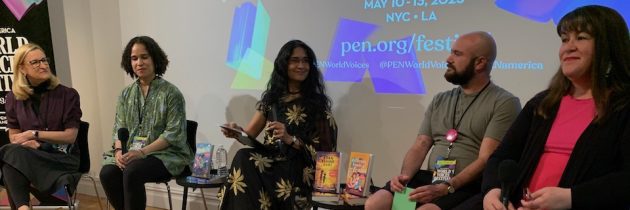
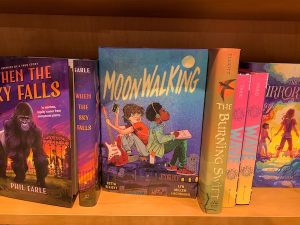





0 Comments
Trackbacks/Pingbacks